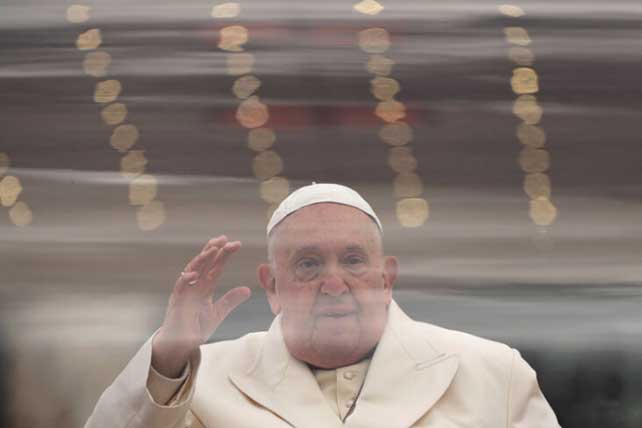At a papal audience on March 27, Francis warned participants in the Minerva Dialogues of the dangers of AI, drawing examples from the biblical Tower of Babel, a lesson about human attempts to rival God. The pope probed for answers about technical matters: Can institutions hold technology companies accountable for the impact of their products? Will AI increase inequality?
But Francis also expressed concern for the human community. “Could we lose our sense of having a shared destiny?” he asked in his speech. “Our true goal must be for the growth of scientific and technological innovation to be accompanied by greater equality and social inclusion.”
Together with the Vatican Dicastery for Promoting Integral Human Development, then led by Cardinal Peter Turkson, Tighe organized a 2019 conference titled “The Common Good in the Digital Age.” Later that year he visited Santa Clara University in California to discuss AI with Western and Eastern scholars.
Francis’ growing interest in AI is shown in the theme he chose for his 2024 message on the World Day of Peace, on Jan. 1, when he spoke of the “urgent need to orient the concept and use of artificial intelligence in a responsible way.”
The Vatican’s Pontifical Academy for Life, led by Archbishop Vincenzo Paglia, has also organized events and conferences drawing attention to the ethical implications of AI. In February 2020, the academy organized a conference titled “The ‘good’ Algorithm? Artificial Intelligence: Ethics, Law and Health,” drawing leading thinkers in the field, including the Rev. Paolo Benanti, the pope’s adviser on AI, who serves as a liaison between the Vatican and the United Nations on emerging technologies.
The conference led to the creation of the “Rome Call for AI Ethics,” a document signed by IBM, Microsoft and U.N. Food and Agriculture Organization representatives. It lays out guidelines for promoting ethics, transparency and inclusivity in AI. On Wednesday, Chuck Robbins, chairman and CEO of computer giant Cisco, came to the Vatican to add his name to the list of signatories.
Catholics at every level are also grappling with the existential implications of this technology. Last week, Catholic Answers, a California Catholic evangelization group, rushed to change the name of its chatbot, Father Justin, after complaints — and a bit of ridicule — from those who found a virtually collared dispenser of AI advice problematic.
“We have rendered ‘Fr. Justin,’ just ‘Justin.’ We won’t say he’s been laicized, because he never was a real priest!” said a press statement from Catholic Advocacy group on Wednesday.
Some Catholic groups are being more deliberate. The Catholic company Longbeard created Magisterium AI, which is compiling an accessible database of all the church’s teaching. “We were trying to build the most Catholic AI that we could,” said the founder of Longbeard, Mathew Sanders, during a news conference at the Pontifical Oriental Institute titled “AI at the Service of the Church’s Mission” at the Vatican on April 18.
Magisterium AI attempts to avoid errors by inserting strict rules for sources and transparency into its programming, but it’s not perfect. When asked about whether pastors can bless couples in same-sex relations, Magisterium AI answered no, despite a recent decision by the Vatican’s doctrine department to allow the practice.
The system, which relies on a massive amount of documents in numerous languages, will also have to struggle to keep up with Pope Francis’ own style and leadership, which tends to leave official doctrine unchanged while promoting new attitudes and openness though actions and dialogue. Despite the hurdles, it’s essential that the church remain involved in the field of AI, Sanders said.
If politicians are busy with more pressing issues and tech companies are kicking the can on the downsides of AI, Sanders said that it’s up to the church to be prophetic. “How can the church help facilitate the conversation to address the downsides of this emerging technology?” he asked.
The Rev. Michael Baggot, who teaches bioethics at the University of Regina Apostolorum, is engaged in academic dialogues on AI and the Catholic faith. He envisions a day when robots might be spiritual gurus or religious assistants, even though “only a weak, frail, sinful human being can actually administer the sacraments,” he said in an interview.
According to Baggot, the church must set aside any fear and actively engage with AI and emerging technologies, and to prove it he set out to speak with Desdemona, an AI-powered robot who made the closing remarks at the Vatican conference.

